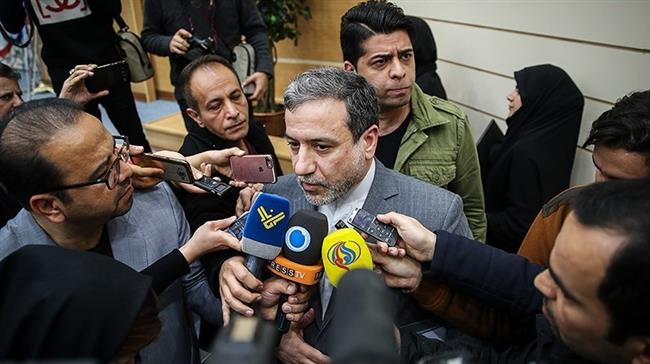Vetoed anti-Iran UN resolution another defeat for US: Araqchi


A senior Iranian diplomat says veto against a United Nations draft resolution aimed at pressuring Iran over alleged missiles provision to Yemeni forces represented another setback for the United States.
Russia on Monday vetoed a resolution at the UN Security Council, presented by Britain and strongly backed by the United States, that called for “additional measures” against Iran over accusations that it violated the 2015 arms embargo on the war-torn Arabian Peninsula state.
The draft resolution gained 11 favorable votes at the 15-member Security Council but was blocked by Russia’s veto. China and Kazakhstan abstained, while Bolivia also voted against the measure.
A group of so-called independent United Nations experts monitoring the sanctions on Yemen reported to the Security Council in January that it had “identified missile remnants, related military equipment and military unmanned aerial vehicles that are of Iranian origin and were brought into Yemen after the imposition of the targeted arms embargo.”
Speaking to reporters on Tuesday, Iranian Deputy Foreign Minister for Political Affairs Abbas Araqchi rejected the “spiteful” allegations.
“Based on a one-sided report, they intended to pass a resolution that also referred to Iran, but they failed,” Araqchi said.
“This is yet another failure by the US government to drag Iran to the Security Council,” he added.
“Over the past year, the US government has on many occasions tried to one again drag Iran to the Security Council and it has failed every single time and this is another sign of the US isolation on the international scene and the strength of the Islamic Republic of Iran,” the senior Iranian diplomat pointed out.
He emphasized that the “biased accusations” were absolutely clear in the way the report was formulated by the UN panel.
He said the UN experts had “made their own judgment even before travelling to Iran to discuss and hear our comments.”
It was clear how others had influenced the report, Araqchi added.
“We will definitely continue our policies in the region in a way that will meet the country’s interests,” he said.
The Houthi movement has been defending Yemen against a bloody Saudi-led military campaign, which was launched in 2015 with the help of the US and the UK to reinstall the country’s former Riyadh-friendly government.
During a meeting of the Security Council on February 21, Russian Ambassador Vassily Nebenzia voiced his country’s opposition to the Security Council resolution.
“We do not like condemnations at all, no, in general,” Nebenzia said, adding, “It is a resolution about the extension of the working group, not about Iran. So we should concentrate on extending the working group first.”
Iranian Foreign Ministry Spokesman Bahram Qassemi earlier this month once again rejected the allegations about the Islamic Republic’s provision of missiles to Yemeni forces, saying such claims are lies and a foolish scenario.
“Iran’s missile program is for defensive and deterrent [purposes] and claims about the dispatch of missiles to Yemen despite the all-out blockade on this country are lies and a foolish scenario designed to exonerate the aggressors,” Qassemi said.
The chief commander of Iran’s Islamic Revolution Guards Corps (IRGC) also in January dismissed the allegations leveled by the US and its allies about the Islamic Republic’s provision of missiles to Yemeni forces.
“Missiles fired at Saudi Arabia belong to Yemen which have been overhauled and their ranges have been increased,” Major General Mohammad Ali Jafari said.
US threatens to take unilateral action against Iran
After Russia vetoed the Western bids at the Security Council, the United States threatened unilateral action against Tehran.
“If Russia is going to continue to cover for Iran, then the US and our partners need to take action on our own. If we’re not going to get action on the [Security] Council, then we have to take our own actions,” US Ambassador to the UN Nikki Haley told reporters on Monday during a visit to Honduran capital Tegucigalpa.
However, she did not specify what kind of action could be taken.
“Obviously this vote isn’t going to make the decision on the nuclear deal. What I can say is it doesn’t help,” Haley said, referring to the multilateral nuclear agreement reached between Iran and the P5+1 group of countries in 2015.

She added, “That just validated a lot of what we already thought which is Iran gets a pass for its dangerous and illegal behavior.”
Iran and the five permanent members of the United Nations Security Council – the US, France, Britain, Russia and China – plus Germany signed the nuclear agreement on July 14, 2015 and started implementing it on January 16, 2016.
Under the JCPOA, Iran undertook to put limits on its nuclear program in exchange for the removal of nuclear-related sanctions imposed against Tehran.
Trump has repeatedly described the JCPOA, which was negotiated under his predecessor, Barack Obama, as “the worst and most one-sided transaction Washington has ever entered into,” a characterization he often used during his presidential campaign, and threatened to tear it up.
Trump on January 12 reluctantly agreed to waive sanctions against Iran that were lifted as part of the landmark deal, but said it would be the last time he issued such a waiver unless conditions were met.
The US president said he wanted America’s European allies to use the 120-day period before sanctions relief again came up for renewal to agree to tougher measures and new conditions, otherwise Washington would pull out of the deal.












